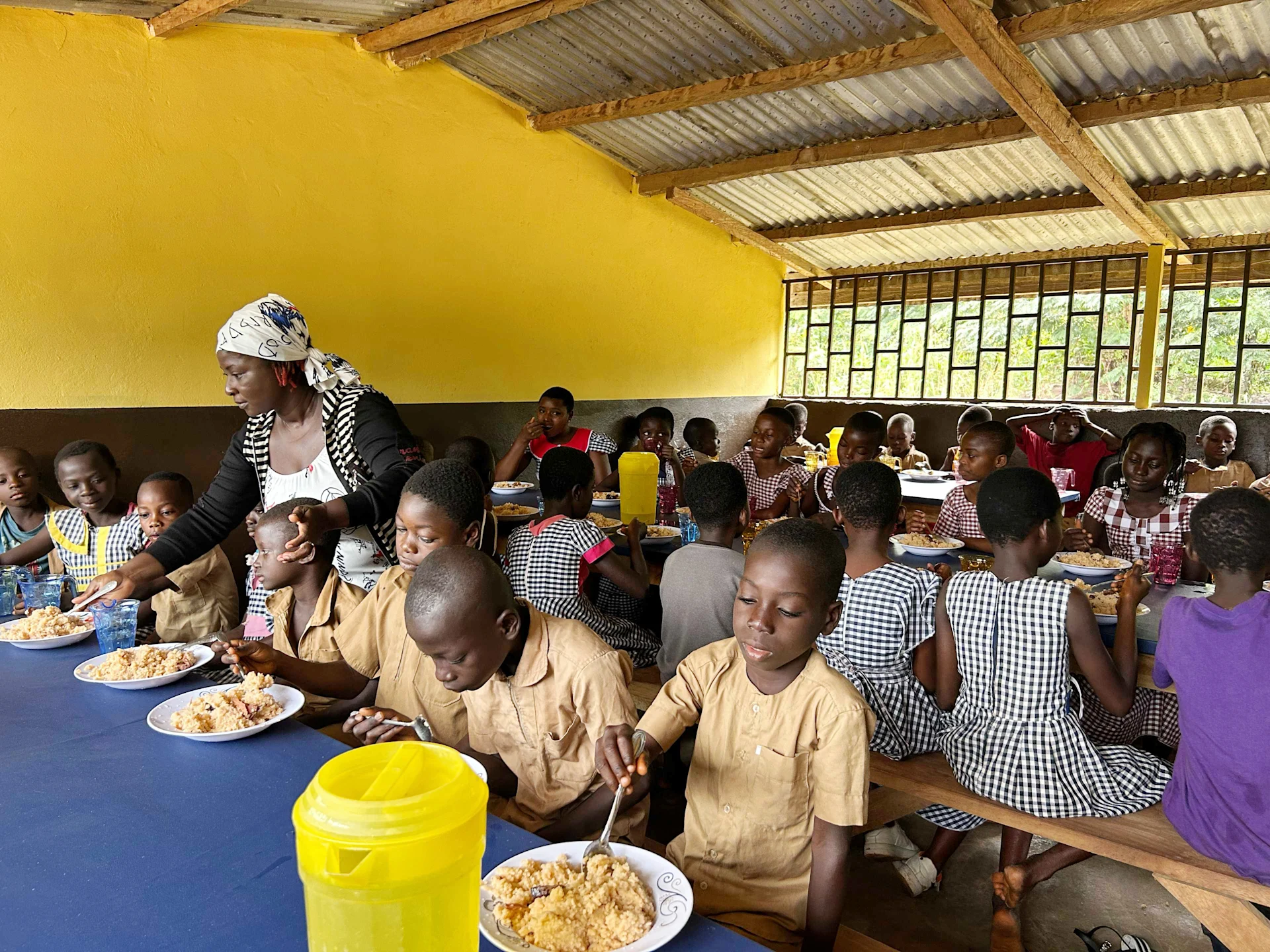
Sustainability
Do something good for CHF 0.50
If you buy a bar of "Côte d'Ivoire" chocolate, you will be contributing to a success story in West Africa.
navigation

Culture Percentage
Poverty can strike people quite suddenly. But the road out of it is a long and arduous one. Elif Kaya is walking it. Above all for the sake of her three children.
Some days she had nothing to put in their snack boxes. So Elif told the nursery that they’d be off sick. She was ashamed. But poverty is not something people choose. There is always a story behind it.
Elif's began on the kitchen counter. It was still dark outside when she handed him the divorce papers. "You have to go," she told him. In a matter-of-fact way, as though she'd cried all her tears. He was shocked and shouted "how dare you leave me". Then he went, leaving behind two children and CHF 200 in cash. It would be the last money she saw from him. That's Kaya's account.
In Switzerland, there are 702,000 people living in poverty. Single parents are often affected. Around a quarter are at risk of poverty with almost one in eight single parents living below the poverty line. That is the story federal government statistics tell. It is almost always mothers who are affected because in most cases they bear responsibility for childcare.
Her youngest son is hanging onto her leg when Elif opens the door in a suburb of Zurich. "I'm really sorry, my children are ill," she says, picking up a few small jumpers from the floor. There is a cartoon show on the TV and selfies with the children hang on the walls. Just around the corner is the kitchen counter where she asked for a divorce seven years ago.
There was never any question over who would take the children. "But I wouldn't have let him have them anyway," says Elif. She is 31 years old and grew up in Switzerland with Turkish parents. Elif isn't actually her real name. Today she is no longer ashamed about her situation. But after speaking out once in a newspaper, she experienced a lot of hatred. Strangers – and what hurt her most, other mothers – responded judgmentally, calling her a bad mother. She no longer wants to see such comments associated with her name.
Her husband was the family's breadwinner, she explains. When he left her with just CHF 200, she was desperate. She didn't know what to do so contacted the social welfare office. The process takes time, and the money took a long time to come through. When down to her last CHF 50, she visited the office in person. She told them she didn't know how she was going to feed her children. She pleaded for immediate support.
The granting and amount of welfare benefits are governed by the Swiss Conference for Social Welfare (SKOS). For individuals, the minimum subsistence level is currently CHF 1,031, excluding rent and health costs. Single parents with three children like Elif receive CHF 2,206.
She receives the payments. But she still often runs out of money part way through the month and doesn't know how to make the next rent payment. She writes to friends and family, asking them to lend her money so she can buy food. The divorce put strain on her and she began to suffer from depression. She starts ordering things online that make her feel good but that she can't afford. She gets into debt.
"I never learnt how to manage my money," says Kaya. Neither at home with her parents nor at school. She only learned how to draw up a budget after attending a course. She now sits down every month and divides up the money. She does this week by week. She finds this easier than planning for a whole month. "That way, if I run out of money on a Thursday, I know I'll have some more on Monday." That leaves around CHF 200 to 300 per week. She makes meal plans with the children and only buys the things on her shopping list. She usually just about gets by.

Struggling alone is new territory for Elif. She met her ex-husband when she was 15 years old. Then everything happened very quickly: They fell in love, got engaged and her parents were already planning the wedding. "In our culture, you don't walk around holding hands." There was a wedding celebration in a princess dress and carriage one month before she turned 18.
Soon the first baby was due. It cried a lot, Kaya hardly slept at all. She quarrelled with her husband. 17 months later, the second child was born prematurely. But it is calmer than the first, and things seem to be improving. That's until Kaya starts a part-time job about three years later. Her husband is opposed to it. They argue again; she recalls that he became aggressive, sometimes even violent. This is Kaya's version of events.
One morning in January 2018, she decides to end her marriage. A two-year divorce battle ensues. When he finally signs the papers, she is already pregnant by her new boyfriend. But that relationship does not last. "Life can sometimes be unkind," she says. But you learn from bad experiences. Does she regret her marriage? "No," she says without hesitation. "I have lovely children from it."
After separating from her husband, she wanted to become a carer herself. But it's not that simple. She gave up her apprenticeship as a hairdresser at the age of 16. That makes her one of around 14 per cent of Swiss people who have never completed training. Statistics indicate they fall into poverty twice as often as people with vocational training.
Kaya decides to get an apprenticeship and wants to become a carpenter. She comes across "AMIE Zurich", a work integration programme for young mothers who have no initial training. Everything falls into place, except for the costs. The social welfare office does not want to cover the CHF 2,250 per month. So she tries to arrange things herself and writes over 50 applications. She is despondent after not getting a single interview. When she queries why, she is told that the apprenticeship is too strenuous for a mother with three children.
"Poverty is not an individual problem, it's a structural one," explains Nina Brüesch from ZHAW Social Affairs. Single mothers without qualifications often get stuck in their situation. This could be remedied by training programmes geared to life circumstances, such as part-time apprenticeships. "Many mothers are under great financial pressure," explains Brüesch. She believes more support in this area is also needed. One option would be supplementary family benefits, like those already paid out by some cantons. Another would be low-cost or even free childcare places.
In Kaya's case, the social welfare office covers the daycare centre costs. But she still cannot find an apprenticeship on her own. In every conversation with her social worker, she brings up "AMIE Zurich" again, writing parallel emails to the social welfare office team and the canton of Zurich. Then finally, after three years, she is accepted.
She joins the programme in February 2022. "The aim is for mothers to find and successfully complete an apprenticeship," reveals Nadja Fuchs. She manages the "AMIE Zurich" programmes run by Swiss Labour Assistance (SLA) Zurich.
When Kaya starts talking about the one and a half years at "AMIE Zurich", the stories come gushing out. She recalls how she was good at maths right from the start. She remembers how the other women asked her what she was doing there, even though she spoke German so well. And how they discussed the role of women in the module on 'Women, Mothers and Society'. She tells of how she learnt to budget and write job applications.
Yet she was still unable to find an apprenticeship as a carpenter. Her coach advises her to apply for a housekeeping position. Finally, a regional hospital invites her to a taster week. "Everything went wrong," recalls Kaya. On the very first day, the school called to say that her daughter was ill and needed to be picked up. On the third day she caught a virus and was ill for the rest of the week. "As a mum of three, problems always crop up." That requires greater understanding from employers.
Understanding that the hospital was willing to show her. She got the apprenticeship. She is now in her second year and working 80 per cent. "They told me at the start that I could cut back if I got good grades at school." So she puts in twice the effort. Because she has a goal: After her apprenticeship, she wants to be earning CHF 5,500 and finally get off welfare.
That means taking a lot on. She takes her son to daycare early in the morning. By the time the two older children get up, she is already cleaning bed linen or preparing operating theatres at the hospital. In the evening, she cooks, does homework with the children and puts them to bed. Then she sits down to study.
Kaya hardly has any time to herself – just the first hour of the day. At five o'clock, when the children are still asleep. Then she makes herself a coffee, sits down on her sofa and listens to Turkish pop music.
Discover exciting stories about all aspects of Migros, our commitment and the people behind it. We also provide practical advice for everyday life.